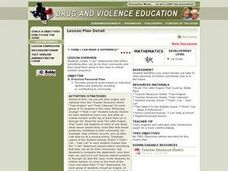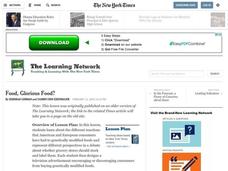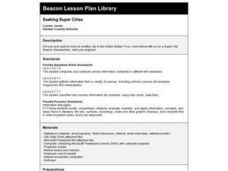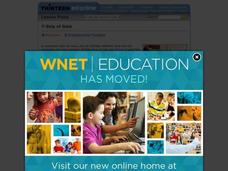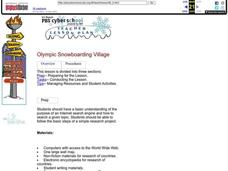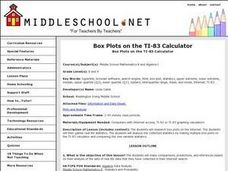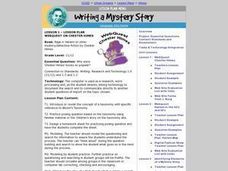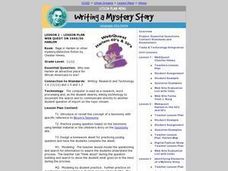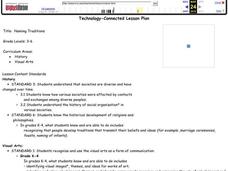Curated OER
Robotics
students identify and research robots in various roles in society, and create robotic arms and multimedia presentation based on their findings.
Curated OER
Introducing the Use of Dichotomous Keys to Students
Students are introduced to the use of dichotomous keys as a simple means of beginning scientific observations in nature. They comprehend how to use a dichotomous key. Students distinguish characteristics of a group of organisms. They...
Curated OER
Needs of Living Things
Students discuss and explore the needs of living things. They choose to create a slide show with captions, create a web showing the needs of one Organism using KidPix. or make picture book by hand or using Microsoft Publisher.
Curated OER
Explore the Animal World
Third graders use a variety of resources to do research on an animal. Their final project is a graphic organizer for display and an informative multimedia slide show.
Curated OER
National and Regional Identity
Students examine state quarters to identify symbols that represent national and regional identity. They discuss the process used to determine what is put on the quarter. They review colonial money, and euros to look for cultural images.
Curated OER
A Blending of Socialism and Capitalism
Students conduct Internet research on China's economic development and use a worksheet to organize their findings. They participate in class discussion and compare and contrast the economies of the U.S. and China.
Curated OER
We Like to Imagine - Animals
Students describe a pretend animal. They read "The After School Monster." Students read other books and discuss whether or not the characters are real. Students make a drawing of a pretend animal and of a real animal. They make up a...
Curated OER
I Think I Can Make a Difference!
First graders write "I Can" statements to tell what they can do to help their community. They write the statements on a train car that has a number written on it. They share their statements in order of the number of their train car...
Curated OER
Food, Glorious Food?
How are the reactions between American and European consumers different when it comes to genetically modified foods? Use the New York Times article "Consumers in Europe Resist Gene-Altered Foods" to inform your middle schoolers...
Curated OER
Cell Analogies!
Liken a cell and its organelles to a tiny person and its organs. After gathering information on cell structures and their functions, small groups collaborate to come up with an analogy of their own. They produce a collage describing the...
Curated OER
Seeking Super Cities
Young scholars view a Powerpoint presentation on various cities in the U.S. They conduct research on two cities, complete a data chart on the two cities, and decide which one they would prefer to live.
Curated OER
An Uplifting Experience
Learners examine the forces that affect the flight of airplanes through the use of paper airplanes. They conduct Internet research, conduct experiments demonstrating Bernoulli's Principle, and design and construct a paper airplane.
Curated OER
Ship of Gold
Students research the events that were taking place in the U.S. during the time period when the SS Central America sank, and explore the adventurous, innovative, and individualistic traits that often define the American spirit.
Curated OER
Cancer in My Classroom I
Student explore cancer, its causes, and various types. Middle schoolers research compare/contrast a health cell to a cancer cell. They compare treatments available for childhood cancers.
Curated OER
Olympic Snowboarding Village
Students adopt a country to research and tour the country online. They plan a trip from Nagano back home to their country.
Curated OER
Evaluating Web Sites
Students determine how to critically evaluate visual and medias aspects of web sites. They examine the purpose of assigned web sites.
Curated OER
Box Plots on the TI-83 Calculator
Eighth graders research box plots on the Internet. They gather real life statistics and analyze the collected statistics by making multiple box plots on the TI-83 calculator.
Curated OER
Bats, Bats, Everywhere!
Students research information on bats while working in cooperative groups. They design posters with the information from their research.
Curated OER
WebQuest on Chester Himes
Students perform a WebQuest to find out why Chester Hime's detective books were so popular. Small groups perform the research together then report to the class.
Curated OER
WebQuest on 1940/1950 Harlem
Students perform a WebQuest to fin out why Harlem was an attractive place for African Americans to live. Small groups perform the research together, and report to the class.
Curated OER
Naming Traditions
Students get to know each other better and research their family and community history. After students research their own and their parents' names, they notice names in literature, history, and other studies and know more about these names.
Curated OER
Quilting Our Communities
Students share personal artifacts and use them to make a classroom community quilt.
Curated OER
Forming Groups
Young scholars create groups (teams) the way a teacher hopes they -- various different ideas are presented.









